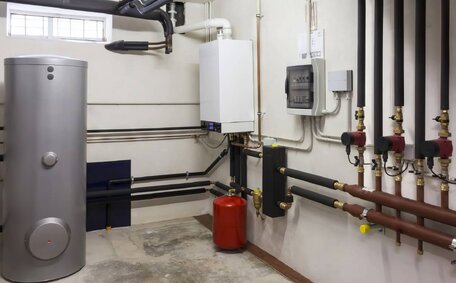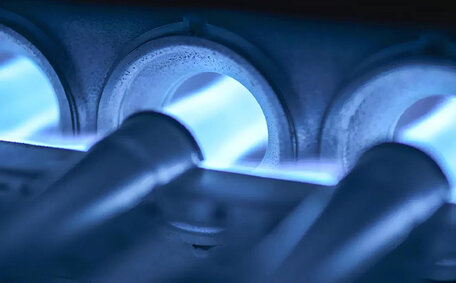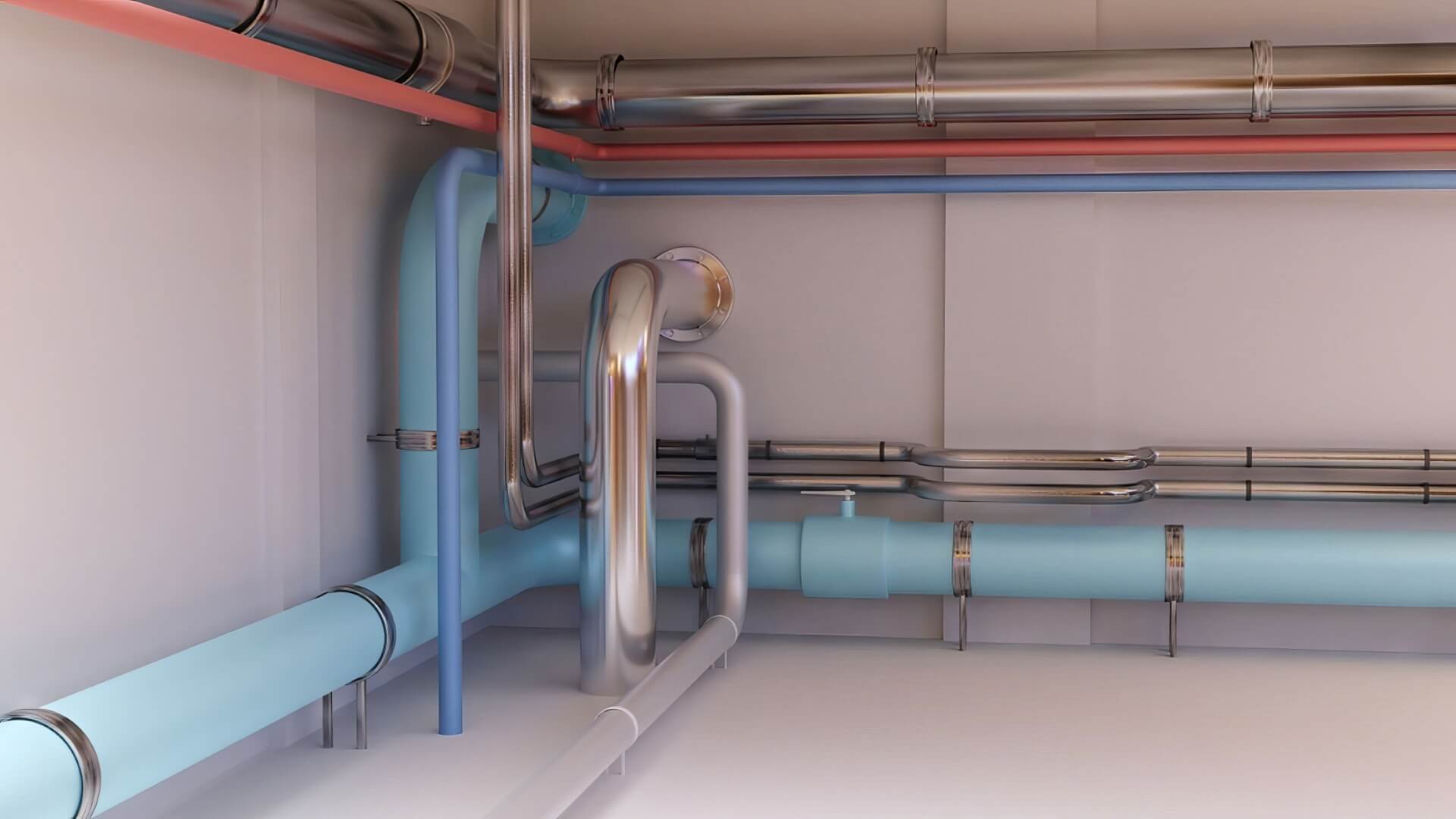What causes unpleasant plumbing odours?
Several factors contribute to smelly drains and unpleasant odours in plumbing systems:
- Bacteria growth - Bacteria and biofilm that lead to smelly drains can build up inside your pipes, drain traps, and sewer lines, decomposing organic matter and emitting hydrogen sulphide gas with its characteristic rotten egg odour.
- Waste Buildup - Accumulation of fats, oils, hair, and other debris often leads to smelly drains by fostering bacteria growth inside pipes, causing blockages and emitting odorous gases.
- Pipe and seal failure - Damage to drain pipes, joints, seals, and gaskets can cause sewer gases to escape, potentially infiltrating your living spaces with unpleasant odours. This influx of oxygen promotes bacteria growth, subsequently intensifying the odours emitted by blocked drains.
- Improper venting - Blocked or improperly installed vent pipes can prevent odours from dissipating outside, causing them to invade your indoor space instead.
Although pipe relining repairs damage efficiently, proactively addressing blocked drains with professional cleaning to remove wastes and bacteria is essential to reduce buildup and odour emission. Additionally, ensuring proper venting will help mitigate odours after relining, thus improving your home’s smell.
Common sources of drain and sewer smells
Some common causes blocked drains and smelly sewers include:
- Blocked drains - Accumulations of hair, grease, and debris can obstruct drains, leading to wastewater accumulation and sewer odour backup.
- Broken P-traps - P-traps, the U-shaped pipes beneath sinks and showers, are susceptible to cracks which can lead to stinky sewer gases seeping into your home.
- Infrequently used fixtures - A common cause of odours occurs when seldom-used fixtures, like basement sinks or floor drains, remain unused, allowing the water in their P-traps to evaporate and permitting gas and smells to seep through.
Exposure to sewer gases such as hydrogen sulfide can cause headaches, respiratory problems, and other health concerns. When relining pipes, remain vigilant for potential odour sources, particularly accumulated blockages.
Proper maintenance is key to eliminate odours, especially from a sewer drain.
Does relining eliminate odours from pipes and drains?
Indeed, pipe relining addresses the root causes of unpleasant odours to effectively eliminate them. The seamless epoxy barrier created during relining repairs crevices and voids, especially in older cast iron pipes, preventing sewer gas infiltration into living areas.
Relining has been highly effective in creating smooth pipe interiors that prevent waste accumulation and bacteria growth—a key advantage over traditional pipe replacement methods. With fewer areas for odour-causing substances to accumulate, relined pipes can tend to stay fresher.
However, other odour culprits like blocked vents or broken fixtures should still be inspected. Proper drain maintenance through cleaning, which can carried out by trained professionals, will continue to minimise waste buildup and odour potential over time.
By tackling pipe damage and installing a protective barrier, relining provides effective drain repairs, eliminating many common sources of unpleasant drain and sewer odours.
How relining prevents odours by eliminating gaps and cracks
For property owners, trenchless pipe relining offers a highly effective method at preventing unpleasant drain and sewer odours because it reinforces pipes without the cracks, gaps, and damage that permit odours to escape.
The epoxy barrier formed during relining seals cracks and ensures a smooth interior, reducing gas emission and bacterial growth in sewer pipes. Relining also eliminates vulnerabilities in old pipes that are prone to tree root damage and breakage.
By mending the damaged pipe and thwarting the emergence of new fractures with a defence mechanism, relining obstructs sewer gases from permeating the sewer pipe into domiciliary quarters.
Compared to traditional pipe repair methods that involve excavation, trenchless sewer relining causes less disturbance to your property while more comprehensively addressing root causes of odours via an uninterrupted gap and crack elimination.
Regular drain inspections and maintenance like cleaning will ensure any remaining odour culprits are identified and allow you to get rid smelly drains throughout the pipe relining process. But for addressing pipe deficiencies that allow smells to permeate, relining delivers highly effective and long-lasting odour prevention through its seamless and impenetrable epoxy barrier.
Choosing odour-resistant relining materials
When selecting a relining material, it’s crucial to choose an epoxy or resin that’s specifically formulated to resist odours and chemical corrosion.
The material should be compatible, one which plumbers can use for creating new robust seals with the inner lining of the existing pipe, ensuring that a new pipe lining bonds properly and creates a tight seal. Attempting to use a “one-size-fits-all” relining product risks gaps where odours can penetrate.
Engaging expert guidance can save you from future headaches by matching the ideal relining material to your plumbing system and its unique pipe which requires specific attention. Factors like pipe composition and effluent types should determine suitable epoxy or resin choices, and professionals have the know how to match those for optimal results.
Prioritising compatibility helps achieve seamless integration of the relining material with the pipe within the piping network to optimise odour resistance. It also prevents delamination or detachment down the track which compromises odour prevention.
While cost is important, it should not override the benefits pipe relining materials offer in terms of long-lasting odour-blocking effectiveness and suitability factors you can get.
Ensuring proper ventilation to control odours after relining
Proper ventilation is critical for allowing gases and odours to escape after pipe relining. A correctly designed and maintained vent system ensures the balance of air pressure in your plumbing and allows sewer gases to be safely discharged outside.
Vent pipes should extend at least 45 cm above the highest plumbing fixture in your home to safely expel gases and avoid pressure imbalances, warranting a qualified plumber’s attention. It’s advisable to have our team of licensed plumbers inspect the venting after relining to ensure it meets the required standards.
Upon identifying venting problems, a skilled technician can install new vents or remove blockages to prevent gas escape and odour concerns. They may also recommend inline vent filters to neutralise escaping odour-causing gases.
While relining seals pipe defects, complementary ventilation can also help prevent odour coming from unexpected sources. This action hinders the accumulation of gases inside pipes, which could otherwise result in bad smells emanating into living spaces or backing up through fixtures.
By combining robust drainage ventilation with relining, you can effectively manage gases and odours, preventing them from coming your way, for a long-term fresher household air quality.
Importance of P-traps and seals in blocking sewer gas
P-traps play a critical role in blocking the smell coming from sewer gases entering buildings. The U-shaped P-trap beneath sinks, a vital plumbing component, holds water creating a seal that prevents gases from rising into your home.
If the water in a P-trap evaporates due to rare use, or if the P-trap cracks, the seal fails and may emit a foul smell. Gases containing hydrogen sulphide, methane, and other toxins that smell like rotten eggs, and at times even like sewer, can then leak through your drain.
It’s crucial to ensure the P-traps are in good condition during plumbing repairs. Checking for cracks or missing components, topping up water seals, and clearing any blockages helps ensure the trap functions effectively.
A functional P-trap is essential in preventing foul and potentially hazardous sewer gases from entering your home, thereby reducing the risk of indoor air contamination.
Maintaining water seals and the integrity of P-traps during and after relining prevents harmful sewer gases from affecting indoor air quality.
Tips for ongoing maintenance to prevent future odour issues
For a plumbing system that remains odour-free post-relining, follow these maintenance tips:
- Weekly hot water flushes of drains help prevent debris accumulation.
- Avoid pouring fats or harsh chemicals down sinks that can do more than solidify; they can damage pipes
- Use drain strainers to capture hair and food particles before they enter pipes
- Check and refill P-trap water seals under sinks every 3 months
- Inspect vent pipes annually for blockages preventing sewer gas escape
- Address small leaks immediately before moisture damage enables mould growth
- Consider preventive drain cleaners treatments twice yearly to inhibit bacteria growth
Staying attentive with routine maintenance is crucial to get your drains devoid of smelly odours and maintain sewer systems unobstructed, minimising odour risk after relining. Combining this with expert repairs at any signs of issue prevents minor problems becoming major odour culprits.
Regular inspections to identify and address odour sources
Regular professional drain inspections are recommended after relining to identify and remediate any remaining or new sources of odour.
Plumbers can utilise a CCTV drain camera to check for cracks, ruptures, or blockages in relined pipes that may cause odours. Preventative treatments with drain cleaners might also be recommended.
Catching problems early before they worsen prevents costly reactive repairs later. It also sustains the odour prevention gains secured through relining by stopping small issues becoming big odour culprits.
Relining reduces many risks, but regular inspections ensure your system stays sealed and odour-free for the long haul.
When to call a professional plumber for sewer gas issues
It’s time to call a professional plumber like Bossley Park Plumbing If you detect unpleasant and persistent sewer smell, a relining company can assess and rectify issues with drains or vents in your home. Recurring rotten egg odours indicate a gas leak, emitting a hazardous gas smell, allowing potentially hazardous hydrogen sulphide to infiltrate living spaces.
Our team of licenced plumbing specialists employ specialised drain cameras to precisely identify damage within your plumbing, assessing problems such as broken pipes, blocked vents, dry traps, or fractured sewer mains. We can assist in identifying tree roots or other causes of gas escape swiftly and fix problem with the most appropriate remedies for your unique circumstances.
By leveraging our comprehensive trenchless pipe repairs expertise, we could swiftly offer solutions to repair damaged pipes, clear vent obstructions, or perform full sewer line replacements if required. Our non-invasive procedures also guarantee solutions for a blocked sewer with minimal disruption and no need to dig up your landscape.
If you’re experiencing minor sewer gas leaks that may escalate into significant household hazards, call us at Bossley Park Plumbing immediately for a free quote today. Phone 1300 349 338 or email us to schedule an inspection. We delight in addressing challenging plumbing odours and ensuring the safety your family deserves along with your drainage system’s integrity.






